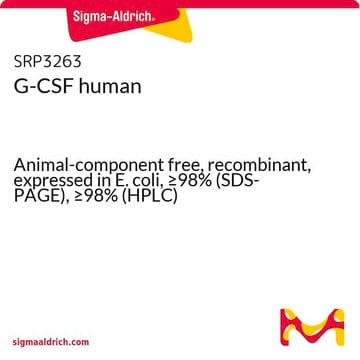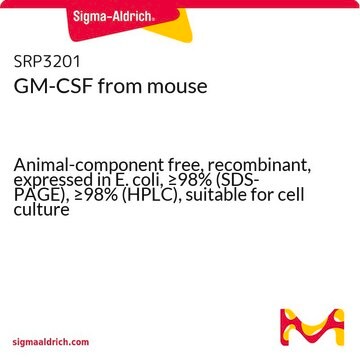SRP3331
G-CSF from mouse
Animal-component free, recombinant, expressed in E. coli, ≥98% (SDS-PAGE), ≥98% (HPLC)
Synonym(s):
CSF-3, MGI-1G, pluripoietin
Sign Into View Organizational & Contract Pricing
All Photos(1)
About This Item
UNSPSC Code:
12352202
NACRES:
NA.32
Recommended Products
biological source
mouse
recombinant
expressed in E. coli
assay
≥98% (HPLC)
≥98% (SDS-PAGE)
form
lyophilized
potency
≤0.05 ng/mL
mol wt
19.0 kDa
packaging
pkg of 10 μg
impurities
endotoxin, tested
UniProt accession no.
shipped in
wet ice
storage temp.
−20°C
Gene Information
mouse ... CSF3(12985)
General description
Colony stimulating factor 3 (CSF-3) or granulocyte colony stimulating factor (G-CSF) is a hematopoietic growth factor. It is produced in response to specific stimulation by a variety of cells including macrophages, fibroblasts, endothelial cells and bone marrow stroma. Human and murine G-CSF is cross-species reactive. Recombinant murine G-CSF is a 19.0kDa protein consisting of 179 amino acid residues.
Biochem/physiol Actions
Colony stimulating factor 3 (CSF-3) or granulocyte colony stimulating factor (G-CSF) stimulates the development of committed progenitor cells to neutrophils and enhances the functional activities of the mature end-cell. It also has a role in macrophage generation and may be involved in immune modulation. G-CSF is being used clinically to facilitate hematopoietic recovery after bone marrow transplantation.
Physical form
Lyophilized from 10 mM Sodium Citrate, pH 4.0.
Reconstitution
Centrifuge the vial prior to opening. Reconstitute in water to a concentration of 0.1-1.0 mg/ml. Do not vortex. This solution can be stored at 2-8°C for up to 1 week. For extended storage, it is recommended to further dilute in a buffer containing a carrier protein (example 0.1% BSA) and store in working aliquots at -20°C to -80°C.
Storage Class
11 - Combustible Solids
wgk_germany
WGK 3
flash_point_f
Not applicable
flash_point_c
Not applicable
Certificates of Analysis (COA)
Search for Certificates of Analysis (COA) by entering the products Lot/Batch Number. Lot and Batch Numbers can be found on a product’s label following the words ‘Lot’ or ‘Batch’.
Already Own This Product?
Find documentation for the products that you have recently purchased in the Document Library.
The importance of the granulocyte-colony stimulating factor in oncology.
Cetean S
Clujul Medical (1957), 88(4), 468-472 (2015)
H S Lu et al.
Archives of biochemistry and biophysics, 268(1), 81-92 (1989-01-01)
Molecular characteristics and secondary structures of recombinant methionyl human granulocyte colony stimulating factor produced by genetically engineered Escherichia coli are described. Limited radiolabeling of the protein with tritiated iodoacetate and determination of the labeled residue revealed that this recombinant protein
Protective role of G-CSF in dextran sulfate sodium-induced acute colitis through generating gut-homing macrophages.
Meshkibaf S
Cytokine, 78, 69-78 (2016)
Gerald Wirnsberger et al.
Nature genetics, 46(9), 1028-1033 (2014-08-19)
Neutrophils are key innate immune effector cells that are essential to fighting bacterial and fungal pathogens. Here we report that mice carrying a hematopoietic lineage-specific deletion of Jagn1 (encoding Jagunal homolog 1) cannot mount an efficient neutrophil-dependent immune response to
Yaron Vagima et al.
PLoS pathogens, 11(5), e1004893-e1004893 (2015-05-15)
Pneumonic plague is a fatal disease caused by Yersinia pestis that is associated with a delayed immune response in the lungs. Because neutrophils are the first immune cells recruited to sites of infection, we investigated the mechanisms responsible for their
Our team of scientists has experience in all areas of research including Life Science, Material Science, Chemical Synthesis, Chromatography, Analytical and many others.
Contact Technical Service







